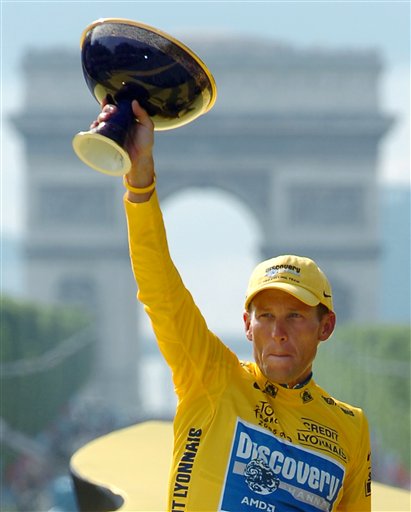I have a friend who will always be able to guess the number I’m thinking. We worked together long enough that she always knew my answer when anyone asked: The answer was always “Seven!”
Need a phone number? “Seven!” What room is the director’s office? “Seven!” What’s the building number for headquarters? “Seven!” I was never right of course…or maybe I was and everyone else was wrong. But that was the number and I was sticking to it.
It’s July now (the seventh month), and I’ve been pondering that number lately…

July is the month of the Tour de France (which has (so far) been postponed to late August this year), and for Lance Armstrong, seven is the record-setting number of consecutive victories he won in that race between 1999 and 2005. Well, it’s the number of Tours in which he stood on the top step of the podium by the end of the grueling twenty-one days of racing. It’s also the number of Tour victories of which he was stripped, and if you look for his name in the record books, you won’t find it. As a matter of fact, if you looked for anyone’s name in the record book, you might be surprised to see that no one won those races. “Why not Armstrong?” is an easy questions to answer. He cheated. After years of repeated, vehement, and vitriolic denial – a time during which Armstrong not only burned every bridge he could find but turned around and dynamited the remains – it turns out he actually did use performance enhancing drugs.
And when he was finally found out some years later, the governing body simply stripped him of his titles and vacated those victories. But here’s what’s really telling: they decided there were no winners because at the time virtually everyone doped. It seemed that stripping the winner of the titles for drugs and then turning around to give the wins to others who probably did the same just wasn’t a good look.
So there the record books sit, with races having been ridden, but (and Armstrong himself seems to get a chuckle out of this one) no one winning.
Just look at the history of cycling at that time though. Of course we know it wasn’t just Armstrong. From the list of “winners” in the years surrounding his victories you’ll find a veritable rogues gallery of “users.” Floyd Landis — 2006: Busted. Stripped. Alberto Contador — 2010: Busted. Stripped (although he kept his 2007 and 2009 victories). Bjarne Riis — 1996: Not busted. Admitted doping. Marco Pantani — 1998: Not busted for doping, but under a constant cloud of suspicion for abnormal blood values until his death from cocaine poisoning in 2004.

And it wasn’t just those on the top step. Amazingly, of the 21 men who took the final podium during the Armstrong run (the top three from each of the seven races), 20 were implicated in doping scandals during their careers. Perhaps most notable (and affected) was Jan Ullrich, the 1997 winner who finished second to Armstrong three times. He was busted for doping later in his career and had all of his race wins after May 2005 removed. And yet he holds no grudges. He and Armstrong keep in touch to this day.
One of the biggest reasons we love sport is because of the pure power, athleticism, and triumph of those who participate. Cheating is abhorrent. But its ubiquitous presence in cycling through the decades before, during, and after Armstrong ironically leveled the playing field. What do we do with this? In a sport where virtually everyone is enhanced, well, it turns out no one is enhanced. When everyone has an “edge,” no one has an edge.
Perhaps we can just simply admit that Armstrong was one of the most dominant athletes of his time. Take away the drugs – take away all of the drugs from every athlete with which he competed – and he still wins. He was just that driven. He was an incredible athlete who cheated, but an incredible athlete nonetheless.

In the end, he lost his titles and was banned from the sport for life. Not because he wasn’t the best athlete, but because, in the words of his rival Ullrich, “He made too many enemies.” Of course, cheaters should have their names stripped from the books. But if you do that during the Armstrong era, the races may as well have never existed. Perhaps the shock value of vacating seven straight titles put a spotlight on the sport and served notice that it needed to clean up its act. Perhaps part of the sport’s recovery is that now we can finally revel in the pure athleticism of its victors and put the dirty past behind us.
And for that we can thank seven-time winner Lance Armstrong. Seven.

———————————
Check out this link for more information on doping during the tour: https://en.wikipedia.org/wiki/Doping_at_the_Tour_de_France

My old Trek has a Tour de France Champion badge on it. There’s no way I’m stripping that. I didn’t find the cheating as abhorrent as the incessant lying. The rumors were there and when Floyd Landis won everyone knew there was something to them. He should have come clean. Anyway he’s done a nice job of rehabilitating his image and I think his presence is good for the sport.
I follow his podcast (actually, best to watch the video on youtube since they’re reviewing his wins now) and think it’s done wonders for interest in the sport again. Yeah, he was an A-1 asshole, and that’s the reason for the lifetime ban i’m sure. But he was still the best. And I think the smackdown he received was both well-deserved and actually humbling enough to be good for him.